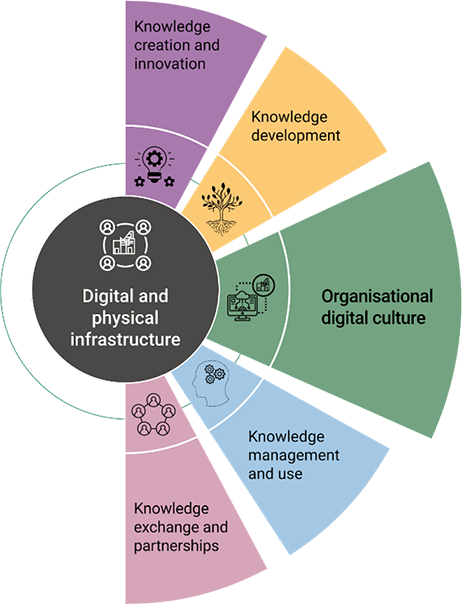Using the framework for digital transformation
The digital transformation framework offers an holistic structure and common language for all areas of activity across a higher education organisation.
The framework for digital transformation in higher education supports the development of a shared understanding of digital transformation across the sector and within HE organisations. It also aims to:
- encourage a holistic approach – identifying patterns and connections across traditional boundaries
- encourage collaborative approaches and build on the collective wisdom of the sector and organisations
- reduce complexity and fragmented processes
- support HE organisations to articulate a strategic vision for digital transformation and develop actionable plans to achieve this
- inform decision making and prioritise investment
- focus on people and practices, not just processes and technology
- highlight leadership and digital capability as critical success factors
We developed this framework with a range of UK professional bodies: Advance HE, Association for Learning Technology (ALT), Association of Higher Education Professionals (AHEP), Association of University Directors of Estates (AUDE), Quality Assurance Agency for Higher Education (QAA), Society of College, National and University Libraries (SCONUL), Universities and Colleges Information Systems Association (UCISA), Universities UK (UUK) and Vitae.
We did this to ensure the framework reflects sector priorities and links to key UK HE models and frameworks that are already in use.

The framework adopts a knowledge practices approach. In addition to the underlying digital and physical infrastructure and the overarching organisational digital culture, the four core knowledge practices focus on the wide range of activities, experiences and practices of an HE organisation:
- knowledge creation and innovation
- knowledge development
- knowledge management and use
- knowledge exchange and partnerships
This takes the emphasis away from technological or business process approaches and puts the focus on what people do (or need to do) to enhance these practices within the organisation. It also aims to help organisations see patterns, links and synergies across traditional boundaries and encourage all stakeholders to take ownership and engage.
"One of the big values of the Jisc framework and the work that we've done in the pilot project is it actually gives us a strong set of benchmarks and targets for us to work around. And I think that sense of having a holistic view of the digital transformation is very helpful. And it's very helpful that it's culturally centred rather than technologically centred, which I think helps it to form a better approach."
Professor Sir Anthony Finkelstein, president, City St George’s, University of London
It is important to note that some aspects of, and critical success factors for, digital transformation cut across the whole framework. These include leadership, strategic vision, appropriate investment, equity, diversity and inclusion, environmental sustainability, stakeholder engagement, security and safety, international activities, staff training and development, and digital wellbeing. These are all included within this framework at various points, but relate to specific practices and areas of work for a particular group of staff or other stakeholders.
The framework structure highlights the importance of using information and data intelligently, building on existing collective wisdom. It also emphasises the impact of knowledge creation, innovation and exchange in a global setting through collaborative social and learning networks. You can use the framework to break down various elements of digital transformation activity into achievable goals and actions.
Try our short Jisc DX lite taster survey which takes you through the six core elements of the framework. For each of these, we highlight the middle stage of digital maturity and offer a checklist of activities as examples of good practice. Save and share your answers with colleagues or get a group of staff to complete it and discuss your findings in a workshop or meeting.
Jisc's framework for digital transformation in higher education is mapped to the Higher Education Business Capability Model V300, part of the Global Higher Education Reference Models (HERM) developed through formalised partnerships between CAUDIT, EUNIS and UCISA Enterprise Architecture (EA) Groups.
Enterprise Architecture Group - in the UK HE and FE sector - UCISA
Next section: Organisational digital culture
View the organisational digital culture element of the framework focusing on how digital affects staff and student capabilities and wellbeing, organisational identity, culture and leadership.
This toolkit is made available under Creative Commons License (CC BY-NC-SA).